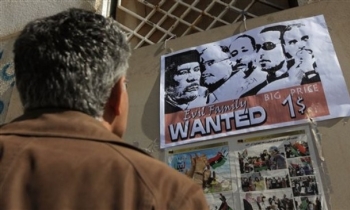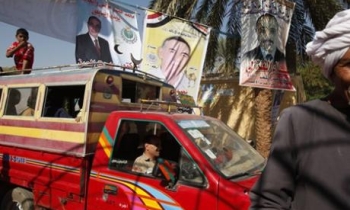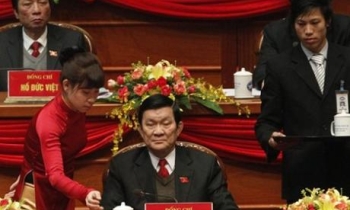From 27 November to 2 December 2008, the International Press Institute (IPI) conducted a high-level mission to Dhaka, Bangladesh to assess the country’s media environment as it prepares for national elections, scheduled for 29 December, as well as to elicit commitments from the heads of the two main political parties to support the right of journalists to report on the general elections without harassment or interference.
Discussions with both media representatives and political leaders showed that Bangladesh’s media faces pressure from politicians unwilling to accept media criticism, an army with a contested press freedom record, and an insufficiently independent judiciary.
The members of the IPI mission met with journalists, editors and media owners as well as with the head of the Awami League, leaders of the Bangladesh Nationalist Party (BNP), the Chief Advisor to the Interim Government, the Directorate General of Forces Intelligence, the Attorney General, and the Chief Election Commissioner, among others.
In the meeting, one of the main problems highlighted by journalists was that media outlets in Bangladesh are politically polarized, and tend to favour either the Awami League or the BNP, the two main political parties. Some journalists noted that they should attempt to bridge this divide by agreeing on best practices of journalism, rather than focusing on supporting particular political parties.
In rural areas, there are considerable challenges for journalists, who practice their profession for little remuneration and often without adequate training. As a result, many have second jobs. Throughout the profession as a whole, there are individual cases of unethical practices and examples of conflict of interest. The result is that there is a real need to bring journalists together in order to seek solutions for these problems.
Editors also expressed the feeling that, while the independent media in Bangladesh enjoys relatively greater freedoms when compared to the media in other Asian countries, some laws and practices continue to represent a source of danger for journalists, and have a chilling effect on their ability to report on issues of public interest. Journalists in Bangladesh are often ensnared in legal cases and accused of extortion. However, it is widely believed that many of the cases are triggered by reports that offend politicians and the authorities, who do not always tolerate criticism.
Impunity is another major problem. Perpetrators of crimes against journalists are generally not prosecuted and the authorities do not seem to take the cases seriously. “Politicians don’t want to solve the problem,†said a journalist who had to leave the profession due to continued harassment. There are also concerns that the aggressive criticism of journalists by politicians and other groups provides a “green light†to the police and the army to harass the media. As one journalist put it: “Without the green light from politicians neither the police nor the army will act†against the media.
Particularly in rural areas, there are concerns about the Rapid Action Batallion (RAB), the elite anticrime force consisting of members of the Army, the Navy, the Air Force and the Police, with some journalists complaining they have been harassed and intimidated.
Several recommendations were put forward in the meeting to upkeep media’s solidarity and unity in condemning press freedom violations. The proposal for the creation of Bangladesh Free Media Centre was made which will work to keep a check on press freedom violations. It will offer a common ground for journalists to develop independent and voluntary codes of conduct affirming fair, balanced and accurate journalism. It will be encouraging dialogue among publishers, editors, journalists to limit the effects of political polarisation on media reports. The centre would also be instrumental in developing the first countrywide network of journalists to support in particular journalists in rural areas. A special mechanism of monitoring, through the network, media freedom violations and attacks against journalists in Bangladesh was also suggested.
The investigative authorities were also recommended to openly and transparently investigate all attacks on journalists and to continue investigations into all cases of murdered journalists. The legal authorities were advised to ensure all Bangladeshi laws meet international standards on press freedom and are in line with the spirit and intent of Article 39 of the Bangladeshi Constitution. A suggestion of enacting a broadcasting law in line with international standards and containing provisions supporting freedom of the press, as well as a suitable commitment to public service was also made. Janakantha editor and publisher, Mohammad Atiqullah Khan Masud’s release from jail was also the part of suggestions. Politicians, government and other institutions in Bangladesh were also instructed to allow the media to report free of all attempts to influence this reporting.
In the meeting with the IPI delegates, Sheikh Hasina, head of the Awami League, stressed her commitment to press freedom during the elections. She said the League was prepared to review the cases of murdered journalists as well as the case of imprisoned journalist Atiqullah Khan whom she noted “is a victim.†She also acknowledged the role of freedom of expression in supporting democracy and secularism, and said that journalists in Bangladesh enjoy full freedom of expression.
Due to the absence of BNP Chairperson Begum Khaleda Zia, the IPI
delegates met with BNP Media Adviser Safik Rehman, BNP's Foreign
Affairs Advisory Committee ambassador Shamsher Mobin Chowdhury, former ambassador Sabihuddin Ahmed and Maj Gen (retd) Fazle Akbar, who is Chairperson Zia’s security adviser. BNP representatives condemned the use of torture by the army. They noted that they not only want investigations into the murders of journalists, but for “all murders to be properly investigatedâ€. IPI offered to provide the BNP with information it has about cases of murdered journalists, and the BNP representatives committed themselves to reviewing such cases. The representatives also said they will review the case of Atiqullah Khan, as they “will do for all the arrests made under the Emergency Power Rulesâ€.
While Dr., Fakhruddin Ahmad, Chief Advisor of the Interim Administration didn’t believe the editor and publisher, Atiqullah Khan’s conviction a result of his journalistic activities. Nonetheless, he emphasized the importance of the press council, media credibility and codes of conduct. He said the media should highlight the problems connected with having individuals buying media outlets and becoming editors for the sole purpose of expressing certain opinions. To Major General Golam Kader, Director General of the Directorate General of Forces Intelligence, IPI pointed out its concerns with regard to attacks against journalists at the hands of the RAB and army. Major Kader said in Bangladesh it appeared that journalists were sometimes guided by personal or political agendas, and eluded to the problem of corrupt journalists. He noted that accountability was particularly important because “information has become an important and powerful weaponâ€.









